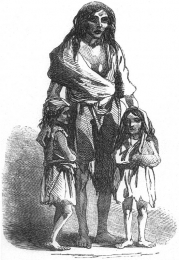Robert Carry: From the Home Front The 80-millioN-strong Irish diaspora owes its existence in large part to An Gorta Mór – the Great Hunger, or Great Famine – which drove millions of Irish people either abroad or into the grave from 1845 until 1849.
 This became an interest of mine when a friend brought me to a patch of ground at Loughlinstown Hospital, which began life as a Famine-era workhouse, and showed me dozens of unmarked, sunken graves.
This became an interest of mine when a friend brought me to a patch of ground at Loughlinstown Hospital, which began life as a Famine-era workhouse, and showed me dozens of unmarked, sunken graves.
While most attribute the disaster to a simple case of crop failure, an alternative interpretation is gathering a following. One website suggests that while the failure of the potato crop was purely an act of nature, the actions of the British government ruling Ireland at the time betrayed an intent to use the disaster to rid Ireland of its dissenting population.
It is widely accepted that the British ramped up food exportation from Ireland during the Famine period, although this could have been about feeding England’s people – who had also become reliant on a failed potato crop – rather than about exterminating the Irish.
However, Queen Victoria’s economist Nassau Senior was quoted as saying that he feared British policies would “not kill more than one million Irish in 1848” and that this would “scarcely be enough to do much good.”
The website in question, at IrishHolocaust.org, highlights some other interesting facts about the period. For instance Lord Trevelyan, the man ostensibly put in charge of ‘famine relief’ in Ireland, maintained for the first two years of the crisis that reports of starvation were being greatly exaggerated. When the hunger was at its worst in ‘Black ‘47’ he declared the famine over and began refusing entry to aid ships sent from the US.
The tone of the website is very strong, and in some ways it undermines the weight of the facts presented. There is a very clear attempt to link the plight of the Irish to the Nazi Holocaust in Europe. On the homepage it says: “As no Jewish person would ever refer to the ‘Jewish Oxygen Famine of 1939–1945’, so no Irish person ought ever refer to the Irish Holocaust as a famine.”
The industrial nature of the Nazi Holocaust sets it apart in my mind from other genocides, and the term ‘Holocaust’ is therefore not an appropriate one to define what happened in Ireland. That being said, there is another, more recent catastrophe that shows much greater similarities to our Famine-stricken era.
The Cambodian genocide was sparked when the Vietnam War triggered a rush of support for the ultra-communist Khmer Rouge, which then swept to power after a civil war.
The Khmer Rouge, which held the reins from 1975 to 1979, drove the country’s urban population into the countryside, where they were forced into collectivised subsistence farming. While this prompted the production of rice to increase during the Khmer Rouge period, over a million Cambodians are believed to have starved or died of hunger-related disease due to the regime’s management of the food it controlled.
The social engineering which saw urban Cambodians reduced to peasantry on the edge of starvation is markedly similar to the Irish experience: specifically the British-introduced Penal Laws that denied the Irish of the right to an education or to ownership of land. The Khmer Rouge also persecuted those with an education and banned private ownership.
Ireland during the Famine and Cambodia under the Khmer Rouge both produced enough food to feed their populations during their respective crises. The British exported Irish produce to England and elsewhere for profit and feeding the empire. The Khmer Rouge exported the rice their subjugated population produced to China in return for the weapons it needed to keep itself in power.
Today, many in Ireland have developed an almost instinctively sympathetic view of the British role in Irish history, and are extremely reluctant to see any undue criticism levelled at the old colonial power. As such, the simple story of how the potato crop failed, leaving the people without enough to eat, will most likely persist.
That’s a real shame. The nameless victims lying in unmarked graves in Loughlinstown and in a thousand other places deserve a more rigorous analysis of why they died.
Robert Carry has worked as a journalist in Ireland, Thailand and Australia











